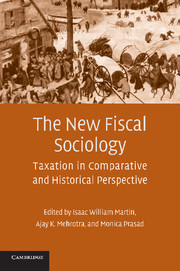Book contents
- Frontmatter
- Contents
- List of Contributors
- Acknowledgments
- Foreword
- 1 The Thunder of History: The Origins and Development of the New Fiscal Sociology
- PART ONE SOCIAL SOURCES OF TAXATION: AMERICAN TAX POLICY IN COMPARATIVE PERSPECTIVE
- PART TWO TAXPAYER CONSENT
- PART THREE THE SOCIAL CONSEQUENCES OF TAXATION
- 10 Extraction and Democracy
- 11 Improving Tax Administration in Contemporary African States: Lessons from History
- 12 Adam Smith and the Search for an Ideal Tax System
- 13 Where's the Sex in Fiscal Sociology?: Taxation and Gender in Comparative Perspective
- 14 The Shoup Mission to Japan: Two Political Economies Intersect
- Epilogue: A Renaissance for Fiscal Sociology?
- References
- Index
11 - Improving Tax Administration in Contemporary African States: Lessons from History
Published online by Cambridge University Press: 13 January 2010
- Frontmatter
- Contents
- List of Contributors
- Acknowledgments
- Foreword
- 1 The Thunder of History: The Origins and Development of the New Fiscal Sociology
- PART ONE SOCIAL SOURCES OF TAXATION: AMERICAN TAX POLICY IN COMPARATIVE PERSPECTIVE
- PART TWO TAXPAYER CONSENT
- PART THREE THE SOCIAL CONSEQUENCES OF TAXATION
- 10 Extraction and Democracy
- 11 Improving Tax Administration in Contemporary African States: Lessons from History
- 12 Adam Smith and the Search for an Ideal Tax System
- 13 Where's the Sex in Fiscal Sociology?: Taxation and Gender in Comparative Perspective
- 14 The Shoup Mission to Japan: Two Political Economies Intersect
- Epilogue: A Renaissance for Fiscal Sociology?
- References
- Index
Summary
It is now unfashionable to seek lessons from history. The overstatements resulting from various stage theories of history, most prominently modernization theory, and the current emphasis on the uniqueness of historical cases, has soured most contemporary sociologists on that endeavor. This is unfortunate, because rejecting the excesses of modernization theory and recognizing that all historical cases are in part unique does not mean that we cannot learn anything from the past that can inform policy in the present and future. Historical sociologists will be unable to contribute to public sociology unless we are able to show how our knowledge of the past can be useful to contemporary policy debates. The attempt to bring historical sociology and public sociology together should benefit both, providing a much needed historical dimension to policy making and broadening the audience for historical analyses.
In general terms, to extract useful lessons from history, we need to accomplish two related tasks. First, we need general theories with abstract scope conditions that facilitate the transportability of models and causal mechanisms across time and space. Second, we need detailed empirical analyses of the relevant initial conditions in the past and present societies being compared, to both reveal how they are similar (the basis for comparison), and how they are different (allowing us to tailor our recommendations to fit the unique features of particular cases).
We begin by using agency theory as a general model of tax administration (Kiser 1999; Klitgaard 1988; Rose-Ackerman 1978).
- Type
- Chapter
- Information
- The New Fiscal SociologyTaxation in Comparative and Historical Perspective, pp. 183 - 200Publisher: Cambridge University PressPrint publication year: 2009
- 11
- Cited by



